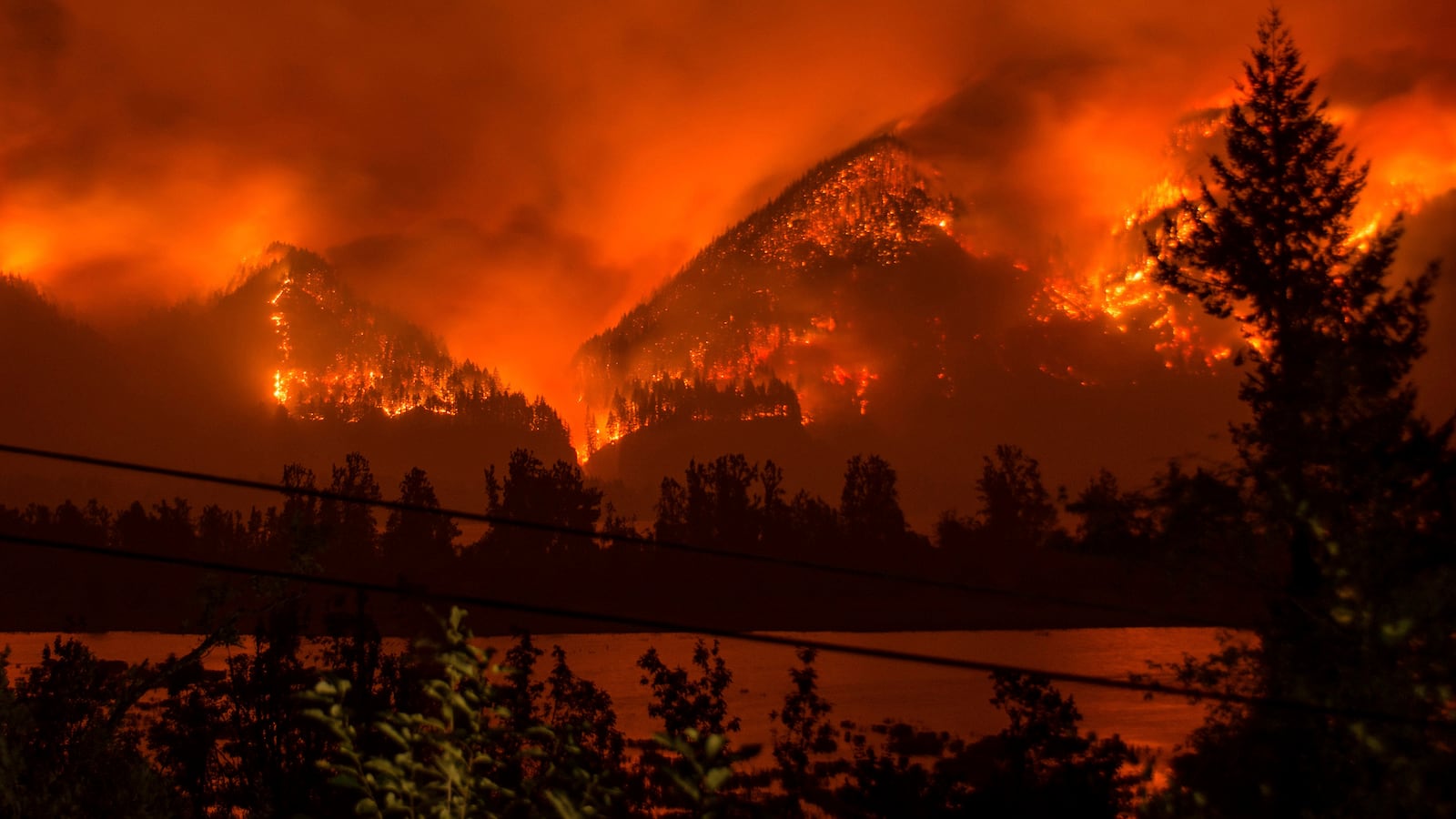While the East Coast prepares for Hurricane Irma, Oregon is battling an inferno that could bleed the U.S. Forest Service dry this week.
More than 30,000 acres of the Columbia River Gorge west of Portland have burned since Saturday, according to Oregon State Police, and almost 2,000 homes are in the path of the fire. Meanwhile, the Forest Service faces a funding shortage, according to Oregon’s congressional delegation.
The Eagle Creek Fire burned through beloved hiking trails after a teenage boy shot off fireworks along the trail on Saturday. The Oregon State Police announced Tuesday that they identified a 15-year-old suspect from Vancouver, Washington but have not made an arrest.
The fire spread west along the Columbia River then jumped across the water to Washington on Monday night. It also caught up to a second fire and now stretches roughly 70 miles along the Gorge. Firefighters managed to contain 5 percent of the blaze, according to the Forest Service.
Smoke and ash from the fire blanketed Portland an hour away, according to resident Rachel Burlington. She usually spends her time outdoors at her job as a horticulturalist, but now she tries to stay inside as much as possible, and she’s not the only one.
“I was out in downtown yesterday there was nobody. I was like, ‘woah, this is weird,” Burlington told The Daily Beast.
She described a haze so thick on Tuesday that it affected visibility, although the sky cleared a little since then. The National Weather Service issued an air quality alert for Northern Oregon and asked residents to stay inside. Burlington said she’s already feeling the effects of the smoke.
“I feel a little dizzy, but I’m just taking it easy,” Burlington said, adding that friends complained of scratchy throats. “Everybody’s wearing masks.”
Oregon’s five representatives sent a letter to Congress on Tuesday ahead of the vote on the Hurricane Harvey recovery bill asking to include funding to fight wildfires like the Eagle Creek Fire. The letter describes a dire budget shortage where the Forest Service will run out of the money designated to fighting wildfires by the end of this week.
“As you know, fires are raging throughout the country. Oregon’s Chetco Bar fire has consumed more than 167,000 acres. Additionally, there are twenty-three other Oregon fires which have burned over 340,000 acres to date,” the letter read, “It is likely the USFS will exhaust all funding for wildfire suppression within days.”
The Forest Service budget problems reach back twenty years, said Cassandra Moseley, a research professor at University of Oregon who studies wildfires. The annual amount of money reserved for fighting wildfires depends on average spending from the previous ten year. However, a combination of increasingly larger fires and higher firefighter and equipment costs means that the budget for wildfires goes up while the total amount of money given to the Forest Service stays the same.
“Fire is taking up an increasing large part of the pie,” said Moseley.
Even when wildfire fighting take up more than half of the Forest Service total budget, as the letter to Congress indicates, it’s still not enough. The Forest Service then dips into other parts of the budget when money for wildfires runs out, often at the expense of services like tree thinning and brush clearing that actually prevent wildfires.
“You start to have more and more trees, it’s more dense, so now stopping [a wildfire] is harder and harder,” said Moseley. That in turn makes the fire more expensive to stop. The letter to Congress also addressed this problem calling it “a vicious cycle.”
Wildfire funding did not make it into the current Harvey bill, but a spokesperson from Rep. Peter DeFazio’s office said that they plan to include it in other disaster relief legislation in the coming months.
Mosley presented a second solution through the Federal Emergency Management Agency. Currently, no FEMA funding goes towards fighting wildfires. FEMA aid during the season’s worst fires could fill in some of the funding gap, said Moseley. Most of the money spent on fighting wildfires come from a small number of large fires that grow out of control.
“It’s kind of like big bad hurricanes - we have big bad fires. We have lots of regular fires just like regular storms then we have these big things that are super expensive and you’re spending millions of dollars a day to fight them,” said Moseley.






